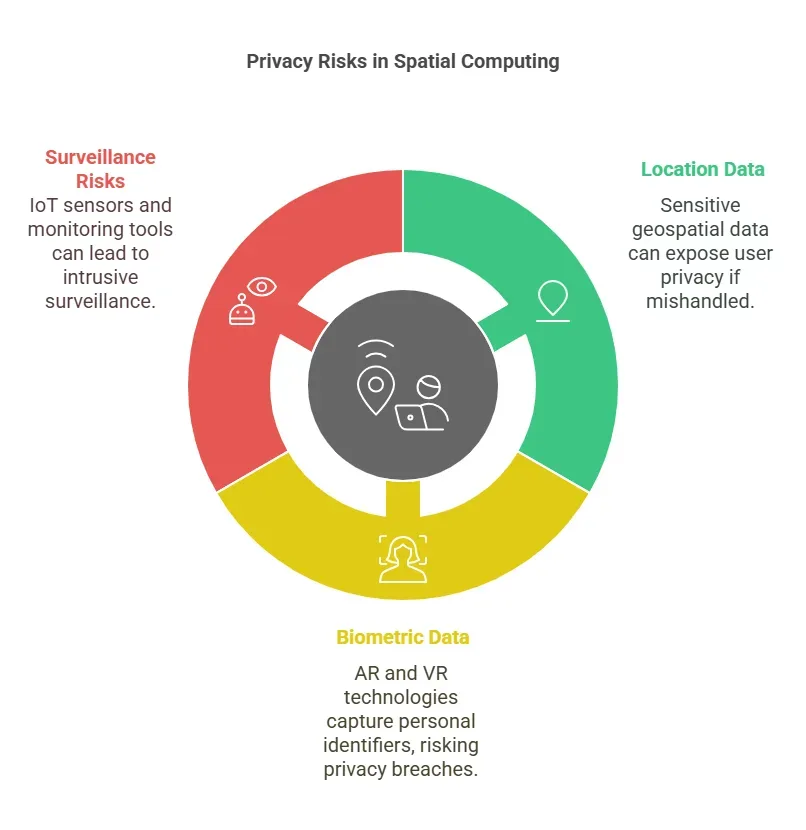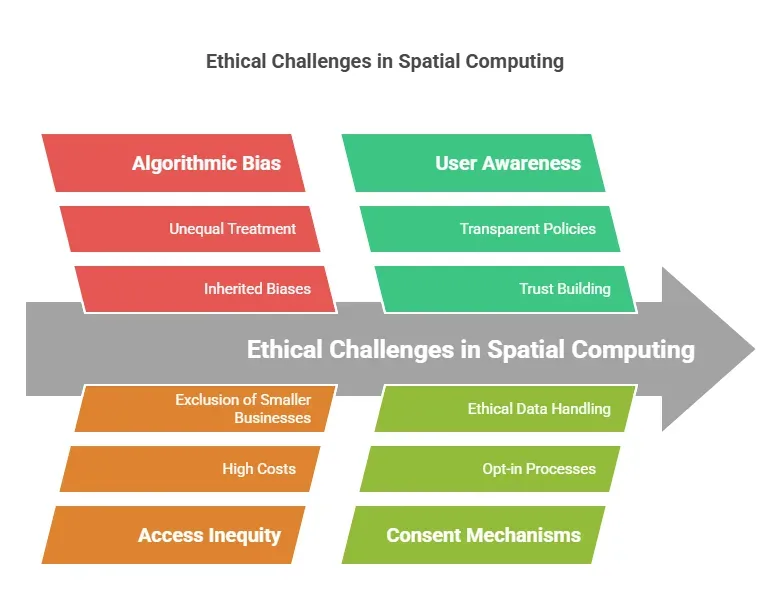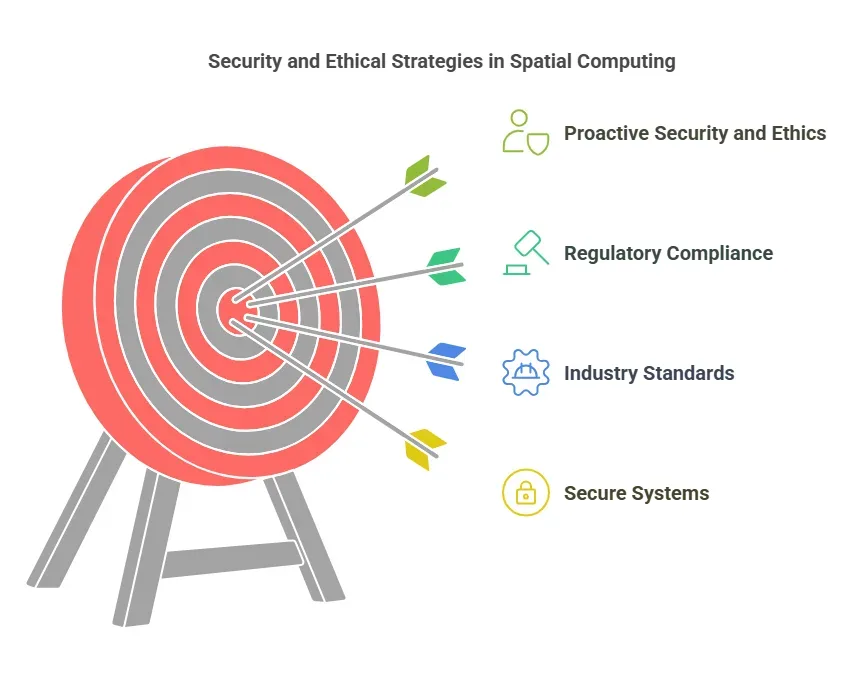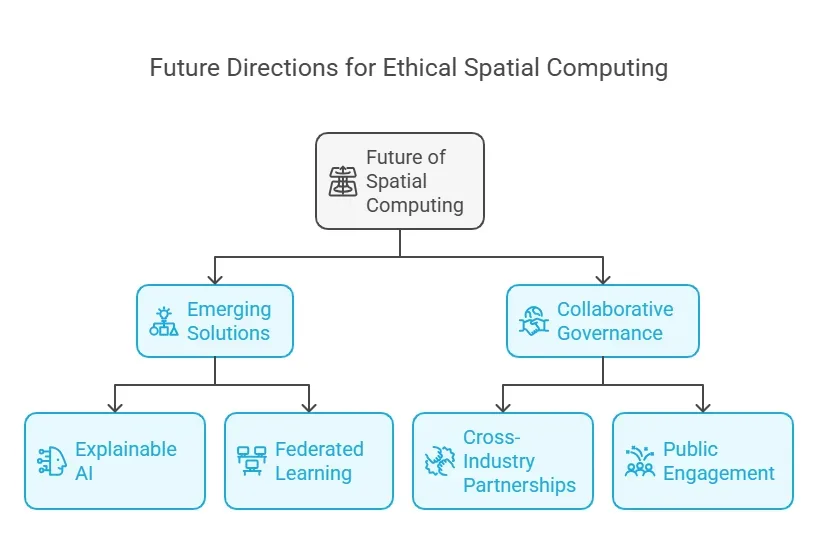As spatial computing reshapes industries and enhances user experiences, it also raises critical concerns around data security, privacy, and ethical practices. The integration of technologies like AR & VR, digital twins, and geospatial analytics introduces challenges in safeguarding user data, ensuring regulatory compliance, and maintaining trust. This cluster explores the key issues, solutions, and future strategies for addressing ethical dilemmas in spatial computing.
Listen to our podcast: Security, Privacy, and Ethical Considerations in Spatial Computing
The Importance of Security and Privacy in Spatial Computing
Spatial computing thrives on collecting and processing vast amounts of real-world data. While this enables innovation, it also increases the risk of data breaches and misuse.
Key Privacy Concerns

- Location-Based Data: Geospatial analytics collects sensitive location data that, if mishandled, can compromise user privacy.
- Biometric Data: Technologies like AR and VR often capture personal identifiers such as facial features, eye movement, or voice data.
- Surveillance Risks: The use of IoT sensors and real-time monitoring tools can lead to intrusive surveillance if not properly regulated.
For a broader understanding of how these technologies interact, refer to the Spatial Computing Pillar Blog.
Ethical Challenges in Spatial Computing

Ethics in spatial computing extend beyond privacy to address fairness, transparency, and inclusivity.
Data Bias and Fairness
- Algorithmic Bias: AI systems powering spatial computing may inherit biases from training data, leading to unequal treatment of certain groups.
- Access Inequity: High costs of implementing spatial computing technologies can exclude smaller businesses and underprivileged communities.
Learn how ethical design principles are essential in emerging technologies by visiting Future Trends & Emerging Tech.
Informed Consent
- User Awareness: Transparent data collection policies are vital for gaining user trust.
- Consent Mechanisms: Clear, opt-in processes ensure ethical handling of user data.
Strategies for Addressing Security, Privacy, and Ethical Concerns

Proactively addressing security and ethical challenges is key to maintaining trust and ensuring the long-term success of spatial computing technologies.
Regulatory Compliance
- GDPR and CCPA: Adhering to global data protection regulations safeguards user rights.
- Industry Standards: Implementing best practices for IoT security and AI ethics ensures safer deployment.
Explore how regulatory compliance intersects with industry applications in Industry-Specific Applications of Spatial Computing.
Building Secure Systems
- Encryption: Protect data transmissions between IoT devices, AR systems, and VR platforms.
- Authentication Protocols: Use multi-factor authentication (MFA) to safeguard sensitive systems.
Integration with Other Spatial Computing Technologies
Enhancing Security with Digital Twins
Digital twins can simulate potential vulnerabilities in systems and test security protocols in a controlled virtual environment. For a deeper dive into this technology, check out Digital Twins & Real-World Simulations.
Privacy Concerns in AR & VR
AR and VR technologies must handle personal data responsibly, ensuring:
- Anonymization: Strip identifiers from collected data.
- User-Centric Controls: Allow users to manage their data permissions easily.
Learn more about privacy challenges in immersive technologies in our AR & VR Innovations cluster.
Future Directions for Ethical Spatial Computing

The future of spatial computing depends on robust ethical frameworks and technological advancements that prioritize user trust.
Emerging Solutions
- Explainable AI: Ensures transparency in decision-making processes.
- Federated Learning: Decentralized machine learning models enhance privacy by keeping data on local devices.
Explore more innovative advancements in Future Trends & Emerging Tech.
Collaborative Governance
- Cross-Industry Partnerships: Develop unified standards for ethical spatial computing.
- Public Engagement: Involve communities in shaping policies to align with societal values.
Conclusion
As spatial computing evolves, addressing security, privacy, and ethical concerns is no longer optional—it’s a necessity. By prioritizing robust regulatory frameworks, user-centered design, and transparent practices, businesses can build trust and ensure the responsible deployment of technologies like AR & VR, digital twins, and geospatial analytics. These efforts will create a sustainable foundation for spatial computing, benefiting both users and organizations in the long run.
FAQ
Q1: Why is privacy important in spatial computing?
Privacy safeguards user data from misuse, ensuring trust and compliance with regulations like GDPR and CCPA.
Q2: How do digital twins address security concerns?
Digital twins simulate potential vulnerabilities, allowing organizations to test and refine security measures before implementing them in real-world systems.
Q3: What ethical challenges exist in spatial computing?
Challenges include data bias, lack of inclusivity, and inadequate consent mechanisms, all of which must be addressed to ensure fair and ethical use.
Q4: How can businesses build trust in spatial computing?
Businesses can build trust by prioritizing data encryption, transparent policies, and user-centric controls to protect sensitive information.
Q5: What are the future trends in ethical spatial computing?
Emerging trends include explainable AI, federated learning, and collaborative governance, all of which focus on creating ethical, secure, and inclusive spatial computing systems.








6 thoughts on “Spatial Computing & Generative AI: Transforming the Future of Digital Experiences”